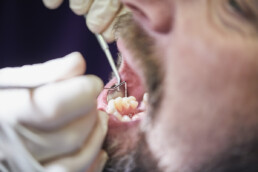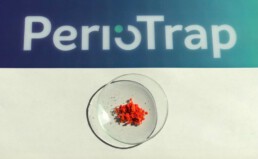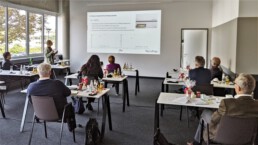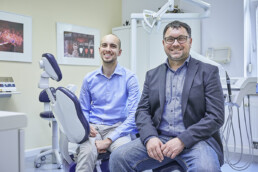Halle (Saale), 05.04.2023. Im Kampf gegen Parodontitis erhält PerioTrap Unterstützung vom Bundesministerium für Bildung und Forschung (BMBF). Mit insgesamt 3 Millionen Euro fördert das BMBF ein Verbundprojekt, an dem neben dem Startup aus Halle (Saale) auch das Fraunhofer-Institut für Zelltherapie und Immunologie IZI, das Fraunhofer-Institut für Mikrostruktur von Werkstoffen und Systemen IMWS sowie die Skinomics GmbH beteiligt sind.
Fokus auf Volkskrankheiten
Unter dem Namen Paropaste entwickeln die Projektpartner neuartige Therapeutika gegen Parodontitis. „Die Förderung des Verbunds ist auf vielen Ebenen für uns ein Erfolg“, sagt Pierre Tangermann, CEO der PerioTrap Pharmaceuticals GmbH. „Zum einen wird die präklinische Qualifizierung unserer Produkte ermöglicht, zum anderen hat diese Entscheidung auch eine weitreichende gesellschaftliche Relevanz. Volkskrankheiten wie Parodontitis werden in den Fokus gerückt.“
Der Druck auf das Gesundheitssystem ist ungebrochen hoch. Mit der Maßnahme „KMU-innovativ: Biomedizin“ unterstützt das BMBF die Entwicklung von Arzneimitteln, die zur Heilung, Linderung und Prävention von Krankheiten beitragen. Ohne grundlegende Innovationen vieler Behandlungen wird sich dieser zudem weiter verschärfen. Neben den persönlichen Schicksalen, sind auch die sozioökonomischen Schäden durch Infektionskrankheiten und nicht übertragbare Volkskrankheiten bereits jetzt sichtbar.
Innovationen entlasten Gesundheitssysteme
Beispielsweise starben im Jahr 2019 laut dem Global Research on Antimicrobial Resistance (GRAM) Report weltweit 1,27 Millionen Menschen an multiresistenten Keimen, gegen die kein Mittel mehr half – ein Systemfehler, denn es gibt kaum Neuentwicklungen. „Die meisten der großen Pharmakonzerne sind ganz aus der Entwicklung ausgestiegen, da die Rahmenbedingungen des Marktes das Geschäftsmodell Antibiotika unattraktiv machen“, sagt Pierre Tangermann. „Es ist daher dringend erforderlich, dass dieses Strukturproblem durch aktualisierte politische Rahmenbedingungen adressiert wird, um die Anstrengungen zur Entwicklung neuer Ansätze durch die Markt-Teilnehmenden zu intensivieren. Das BMBF setzt aus unseren Augen diesen Aspekt förderpolitisch um und trägt somit zur zukünftigen Entlastung der Gesundheitssysteme bei.“
Neue Strategie gegen Parodontitis: Virulenzhemmung
Im Fokus der Paropaste-Untersuchungen: Ein innovatives Therapieverfahren zur kausalen Behandlung von Paradontitis. Grundlage der neuen Behandlungsmethodik ist die Hemmung eines Enzyms, das fast ausschließlich in den Paradontitis-verursachenden Bakterien vorkommt und dort für die Reifung einer ganzen Reihe sogenannter Virulenzfaktoren benötigt wird.
„Durch eine selektive Beeinflussung des Leitkeimes, die jedoch nur dessen Virulenz und nicht wie klassische Antibiotika sein Wachstum hemmen, soll es ermöglicht werden, die Balance des oralen Mikrobioms wiederherzustellen, ohne dabei das gesamte Keimspektrum zu zerstören.“ sagt Mirko Buchholz, CSO der PerioTrap. „Symbiose statt Dysbiose, Balance statt Kahlschlag.“
20 Millionen Patienten könnten profitieren
Bevor die Testung am Menschen beginnen kann, soll eine lokal anzuwendende Formulierung für bereits vorhandene Verbindungen pharmazeutisch erforscht sowie die nicht klinische regulatorische Erprobung des Ansatzes abgeschlossen werden. Dies beinhaltet vielfältige Aspekte, wie mögliche Resistenzbildungen, komplexe Proof-of-Concept Studien, Materialverträglichkeitsuntersuchungen an dentalem Gewebe und Toxizitätsstudien.
Die spätere klinische Anwendung ist vor oder innerhalb der Antiinfektiösen Therapie intendiert. Das übersetzt sich allein für Deutschland in ca. 20 Millionen Patienten, die jährlich von einer besseren Behandlungsmöglichkeit profitieren könnten.
ENGLISH VERSION
Halle (Saale), 05.04.2023. PerioTrap receives support from the German Federal Ministry of Education and Research (BMBF) in its fight against periodontitis. With a total of 3 million euros, the BMBF is funding a joint project involving the startup from Halle (Saale), the Fraunhofer Institute for Cell Therapy and Immunology IZI, the Fraunhofer Institute for Microstructure of Materials and Systems IMWS, and Skinomics GmbH.
Focus on common diseases
Under the name Paropaste, the project partners are developing novel strategies against periodontitis. "The funding of the project is a success on many levels," says Pierre Tangermann, CEO of PerioTrap Pharmaceuticals GmbH. "On the one hand, it enables the preclinical qualification of our products, and on the other hand, this decision also has far-reaching social relevance. Common diseases such as periodontitis will be brought into focus."
The pressure on the healthcare system remains high. With the measure "KMU-innovativ: Biomedicine", the BMBF supports the development of drugs that help to cure, alleviate and prevent diseases. Without fundamental innovations in many treatments, this will continue to worsen. In addition to personal fates, the socio-economic damage caused by infectious diseases and non-transmissible widespread diseases is already visible.
Innovations relieve pressure on healthcare systems
For example, according to the Global Research on Antimicrobial Resistance (GRAM) Report, 1.27 million people died worldwide in 2019 from multidrug-resistant germs for which no drug helped - a systemic failure because there are hardly any new developments. "Most of the big pharmaceutical companies have dropped out of development altogether because the framework conditions of the market make the antibiotics business model unattractive," says Pierre Tangermann. "It is therefore urgent that this structural problem is addressed through updated policy frameworks to intensify efforts to develop new approaches by market participants. From our point of view, the BMBF is implementing this aspect in terms of funding policy and is thus helping to relieve the burden on healthcare systems in the future."
New strategy against periodontitis: inhibition of virulence
In the focus of Paropaste investigations: An innovative therapeutic method for the causal treatment of periodontitis. The basis of the new treatment method is the inhibition of an enzyme that occurs almost exclusively in the bacteria that cause periodontitis and is required for the maturation of a whole series of so-called virulence factors.
"By selectively influencing the lead germ, but only inhibiting its virulence and not its growth like classical antibiotics, it should be possible to restore the balance of the oral microbiome without destroying the entire germ spectrum," says Mirko Buchholz, CSO of PerioTrap. "Symbiosis instead of dysbiosis, balance instead of eradication."
20 million patients could benefit
Before human testing, it is necessary to develop a locally applicable formulation for existing compounds and to complete non-clinical regulatory testing of the approach. This includes multiple aspects such as potential resistance development, complex proof-of-concept studies, material compatibility studies on dental tissue, and toxicity studies.
Subsequent clinical application is intended before or within the anti-infectous therapy, a multifacetted approach of professional mechanical plaque removal and subgingival instrumentation. For Germany alone, this translates into approximately 20 million patients who could benefit annually from improved treatment options.
5. April 2023
Halle (Saale), 23.05.2022. Antimicrobial resistance continues to be on the rise despite increased public awareness. According to a study published in The Lancet, resistant germs were directly responsible for 1.27 million deaths worldwide and played a part in 3.68 million additional deaths [Murray et al., 2022]. One of the main causes of rising resistance is incautious prescription behavior by physicians, as well as the use of antibiotics by patients themselves. Interestingly, more than every 8th antibiotic is prescribed by dentists [zm online, 2022]. PerioTrap's contribution to the solution of this global societal challenge lies on the one hand in the development of local dosage forms: Due to their dosing they provoke lower resistances and at the same time do not trigger systemic resistance effects (e.g. in infectious co-morbidities). On the other hand, PerioTrap is developing highly specific active substances that are directed exclusively against pathogenic germs and their virulence, therefore, possibly avoiding the use of important broad-spectrum antibiotics. PerioTrap has now been awarded a third publicly funded project by IB Sachsen-Anhalt to test these substance’s preclinical safety and efficacy with the help of further project partners.
23. Mai 2022
Halle (Saale), 23.11.2021. PerioTrap has received the official statement of its first Scientific Advisory Board Meeting which was held on October 19th at the company’s offices.
The board consists of leaders and experts in the field of drug design, periodontitis fundamental and clinical research, microbiology as well as pharmaceutical technology. The shared feedback of its internal discussion endorses PerioTrap’s Research Program which was found to be “up and running in a remarkable short time frame. Both drug programs showed significant progress in the last year.”
Dr. Mirko Buchholz, CSO and Co-Founder of PerioTrap Pharmaceuticals states: “We are very happy to welcome these highly recognized experts of the periodontal and drug development fields and to share with them our latest research advancements. To receive such a positive opinion and advice makes us proud and very much confirms us to keep following our route of development.”
PerioTrap’s longterm release formulation of minocycline is about to enter clinical testing while its new chemical entity that addresses the microbiome shift in periodontitis is currently being tested in vivo. In general, it is being advised to stay focused to achieve the next critical milestones.
If you would like to learn more about our programs check out our latest publications.
1. Dezember 2021
Halle (Saale), 16.08.2021. Infectious diseases are often treated with broadband antibiotics that act against a great range of bacteria. The systemic application of antibiotics always has a negative impact of the person’s body, frequently noticeable by side effect on the gastrointestinal tract. In cases like periodontitis, where keystone pathogens disrupt the homoeostasis of a well balanced and diverse microbiota, the eradication of the majority of bacteria poses an even a greater risk. A recurrence of the pathology is almost inevitable if the oral microbiota stays in dysbiosis as pathogens are more likely to colonize when beneficial effects of the commensals are missing. In order to deliver targeted treatments against the disease-causing pathogens, PerioTrap has now been awarded two public grants by the German Federal State of Saxony-Anhalt, AMEPA and ParoStop, with money from the European Regional Development Fund (ERDF). The received funding will be used to progress PerioTrap’s inhibitors and the according delivery technology that ensures a sustained drug release at the site of infection into regulatory stages.
16. August 2021





